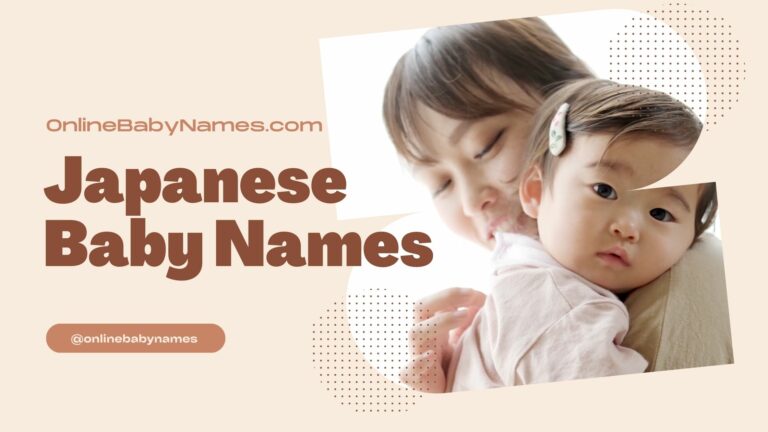
Choosing the perfect name for a baby can be a daunting task, especially when it comes to finding one with cultural significance and meaning. Japanese baby names not only carry a deep sense of heritage, but they are also known for their beautiful, poetic, and sometimes philosophical meanings. In this article, I’ll be sharing some captivating Japanese baby names, their meanings, and how they have become popular choices for parents around the world.
Japan has a rich tradition of naming children with forethought and consideration. Many Japanese baby names have a basis in kanji, using intricate characters with profound meanings. Others are inspired by nature, mythology, or historical figures. Parents often choose names that reflect their hopes, dreams, and aspirations for the child’s future.
Given the cultural importance of names in Japan, as well as the aforementioned factors that go into choosing one, it’s no wonder that Japanese baby names have gained popularity globally. These names offer a unique, meaningful, and poetic touch to honor both the child and the family’s heritage. So, let’s delve into the captivating world of Japanese baby names and explore the beautiful choices available to parents.
The Rich History Behind Japanese Baby Names
Japanese baby names carry a rich history, reflecting the nation’s beautiful culture, language, and time-honored traditions. Delving into this history, I’ve discovered that these names are not only meaningful but also incredibly captivating. Come with me as we explore the fascinating world of Japanese baby names.
The Japanese language itself provides a nuanced and intricate foundation for these names. There are four writing systems in Japan: hiragana, katakana, kanji, and romaji. Baby names predominantly use hiragana and kanji, with hiragana being more common for girls and kanji for boys. The meaning behind each name often derives from the combination of characters used. For instance, the name “Akira” (あきら or 明) can mean “bright” or “clear” while “Haruka” (はるか or 遥) can be interpreted as “distant” or “remote”.
Japanese names typically consist of a family name (surname) followed by a given name, and they hold a significance beyond their appearance. Surnames can represent social status, regional origins, or even carry memories of historical events. Given names, on the other hand, hero praise, cherish personal virtues, or bless the child with a lifelong connection to nature. Additionally, many parents choose names that evoke fortune and good luck for their child’s future.
There are some interesting trends and customs in Japanese baby names:
- Seasonal names: Some names directly relate to the seasons, with names like “Haru” (春) for spring or “Fuyu” (冬) for winter.
- Ordinal names: It’s not uncommon for names to reflect birth order in Japanese families, with names incorporating the words “first” (一), “second” (二), or “third” (三).
- Unisex names: Many names can be used for both boys and girls, such as “Kaoru” (薫) and “Rin” (琳).
- Changing names: In some cases, parents change a child’s name as they grow older, either to shed a childhood nickname or to avoid bad luck.
Names often exhibit regional variations, contributing to a vast pool of choices and meanings. From the elegant-sounding “Miyuki” (美幸) to the strong “Isamu” (勇), Japanese baby names are not only lyrical but also steeped in tradition and symbolism.
In conclusion, Japanese baby names boast a truly fascinating history. Their roots in the language, culture, and traditions of Japan make them some of the most meaningful and captivating names in the world. If you’re looking for a name that holds deep significance and offers a connection to the tradition of Japan, then exploring Japanese baby names might be the perfect choice for you.
Unisex Japanese Baby Names
When it comes to choosing a name for your little one, unisex Japanese baby names have become increasingly popular. These names, which can be used for both boys and girls, often carry meaningful symbolism and elegantly bridge the gap between traditional and modern cultures. In this section, I’ll introduce some beautiful unisex Japanese baby names and explore their meanings.
One key aspect of Japanese culture is the emphasis on harmony and balance. This concept is reflected in many unisex Japanese baby names, as they often carry meanings that signify balance among nature, emotions, and virtues. Some of these names include:
- Akira (明 or 亮): Akira can mean “bright” or “clear,” representing clarity of mind and spirit.
- Haru (春 or 陽): Haru translates to “spring” or “sunshine,” fostering growth and warmth.
- Sora (空): Meaning “sky,” Sora signifies vastness and freedom.
Another category of unisex Japanese baby names centers around virtues and admirable qualities. These names inspire strength, courage, and wisdom in children as they grow up. A few examples include:
- Hikaru (光): Hikaru means “light” or “radiance,” invoking a sense of positivity and optimism.
- Makoto (誠): Meaning “truth” or “sincerity,” Makoto is a name that encourages honesty and integrity.
- Yuki (幸 or 由紀): Yuki represents “happiness” or “fortune,” as well as signifying “valuable story.”
Aside from the examples above, Japanese parents also choose unisex names that are influenced by nature. These names embody the beauty of the natural world and encourage a deep connection with the environment. Some nature-inspired unisex names include:
- Kai (海): Kai means “sea” or “ocean,” symbolizing expansiveness and a sense of adventure.
- Rin (燐, 凛, or 琳): Rin can be interpreted as “phosphorus,” “dignified,” or “jewel,” representing both natural elements and personal qualities.
- Asuka (飛鳥): Asuka means “flying bird,” signifying freedom and adaptability.
Choosing a unisex Japanese baby name not only offers a meaningful name for your child, but it also allows for greater flexibility in the child’s identity and expression. The names mentioned here are just the tip of the iceberg – there are countless beautiful and profound Japanese unisex baby names to consider. No matter which name you end up choosing, it’s bound to carry a rich sense of culture, meaning, and tradition that your child can take pride in throughout their life.
Popular Japanese Boy Names and Their Meanings
Choosing a perfect name for your little one can be quite a task, so I’ll help you by sharing some popular Japanese boy names and their meanings.
Haruto is a top choice and literally means “springtime person”._ Haru_, the first character, symbolizes spring, while to represents a person. This name reflects the refreshing and lively spirit of spring, perfect for your energetic bundle of joy.
Another fashionable name is Yuto, which is a combination of Yu, meaning “brave, gentle, or superior” and to, signifying a person. Yuto can therefore be interpreted as “a brave or gentle person”. It’s a name that can inspire your little boy to value both strength and kindness.
Now, let’s take a look at some more remarkable Japanese boy names:
- Sora: With its meaning as “sky”, Sora inspires a sense of vastness and limitless potential.
- Ryota: Meaning “good, strong, and sturdy”, Ryota is an ideal name for a boy who will grow up to be resilient and dependable.
- Daiki: Signifies “great and valuable” or “great tree”, reflecting the growth, strength, and wisdom a tree gains with time.
Other meaningful names include:
- Kenji: A combination of two characters meaning “wise” and “second-born son”.
- Hiroshi: Meaning “generous” or “tolerant”, inspiring a sense of kindness and understanding.
- Takumi: Signifies “artisan” or “skilled” and represents the mastery of one’s craft.
If you’re looking for a unique name, here are some uncommon yet appealing options:
- Issey: Meaning “first-born”, Issey is the perfect name for the eldest child in a Japanese household.
- Jiro: With its meaning as “second-born son”, Jiro signifies the continuity of family and heritage.
- Kaito: A beautiful name, Kaito embodies the spirit of the ocean, as it means “ocean’s flying navigator”.
To sum it up, there’s an impressive range of Japanese boy names, each with deep-rooted meanings that can resonate with your hopes for your child. Hopefully, you’ll find the perfect name among these choices that personifies your little one’s spirit and character. Happy naming!
Popular Japanese Girl Names and Their Meanings
When it comes to choosing a Japanese girl name, you’ll discover a plethora of beautiful options, each carrying its own unique story and charm. In this section, I’ll share some popular Japanese girl names and their meanings, providing you with insight into what makes each name so special.
Sakura is a well-known Japanese name, thanks to its connection to Japan’s beloved cherry blossoms. Meaning “cherry blossom” in Japanese, this name represents both beauty and the ephemeral nature of life.
Another lovely option is Aoi. With a meaning that speaks to the color blue or green, it evokes a sense of peace, tranquility, and the wonders of nature. Additionally, it carries the alternate meaning of “hollyhock,” a stunning flower that’s often admired in gardens.
For a name that instills a sense of passion and ambition, Hikari is a fantastic choice. As it means “light” or “radiance,” this name serves as a constant reminder of one’s inner strength and potential to shine.
Some other popular Japanese girl names include:
- Yui: This versatile name can have multiple meanings, some of which are “tie, bind” or “gentleness, superiority.” It also incorporates the character for “clothing,” highlighting a sense of elegance and grace.
- Riko: With roots in the kanji for “jasmine,” this name adds a floral touch, while the character for “child” imbues it with a sweet innocence.
- Miyu: Signifying “beautiful” or “gentle,” this name also contains the character for “dream,” inspiring both creativity and wonder.
Here’s a table of the popular names mentioned above and their meanings:
| Name | Meaning |
|---|---|
| Sakura | Cherry blossom |
| Aoi | Blue, green, hollyhock |
| Hikari | Light, radiance |
| Yui | Tie, bind, gentleness, superiority, clothing |
| Riko | Jasmine, child |
| Miyu | Beautiful, gentle, dream |
It’s worth noting that in Japanese culture, names are often written using kanji characters. The meaning behind the name can change depending on the kanji used, offering even more uniqueness and depth to each name.
When choosing a Japanese girl name, it’s essential to consider both the meaning and the characters used, as these factors come together to create a name that carries with it a sense of identity and individuality. Whether you’re inspired by nature, beauty, or ambition, you’re sure to find the perfect Japanese name to celebrate the special little girl in your life.
Influential Figures and Their Impact on Japanese Names
It’s essential to understand the impact of influential figures on the popularity of Japanese baby names. These figures often inspire new naming trends or contribute to the resurgence of classical names.
A prime example is historical figures like samurai and shoguns. Names such as Musashi (武蔵), after the famed swordsman Miyamoto Musashi, or Nobunaga (信長), inspired by the powerful daimyō Oda Nobunaga, still hold a certain appeal for parents who value bravery and strong character.
Famous Japanese literary figures also play a significant role in name choices. Ryunosuke (隆之介), inspired by the writer Akutagawa Ryunosuke, and Soseki (漱石), taken from the legendary author Natsume Soseki, showcase parents’ appreciation for the arts and intellectual prowess.
As for contemporary influential figures, popular athletes and celebrities can’t be overlooked. Skateboarder Yuto Horigome’s recent Olympic gold medal win put his name Yuto (悠斗) in the limelight. Similarly, tennis star Naomi Osaka’s accomplishments have sparked interest in the name Naomi (直美).
Furthermore, fictional characters from manga, anime, and video games notably impact Japanese name trends. Here are some examples:
- Goku (悟空) from Dragon Ball
- Naruto (ナルト) from Naruto
- Totoro (トトロ) from My Neighbor Totoro
It’s also worth noting the influence of foreign names, as global trends seep into Japanese baby name choices. With more international marriages and exposure to other cultures, parents might opt for names like Rui (琉唯), inspired by the Portuguese name Rui, or Sara (沙羅), which shares similarities with the English name Sarah.
To sum up, various influential figures leave a mark on Japanese baby names, with the impact felt across generations and social spheres. Parents often choose names that evoke qualities they want to instill in their children, influenced by historical figures, literature, contemporary celebrities, or even global trends. It’s exciting to witness all these influences at play in contemporary Japanese name culture!
The Role of Japanese Surname Traditions
When talking about Japanese baby names, it’s crucial not only to consider given names but also surnames, as they play an essential part in Japanese traditions. Japanese surnames usually consist of two kanji characters and reflect various aspects of Japanese culture and history.
Japanese surname traditions have roots in the 5th century, but their significance grew profoundly during the Meiji Restoration period (1868-1912). This historic period marked a turning point in the adoption of surnames, as the Japanese government mandated all citizens to choose a family name. As a result, these names originated from multiple sources, such as occupations, geographical locations, and even physical characteristics.
Some prevalent Japanese surnames are:
- Sato (佐藤): meaning “assistant” or “help” and “wisteria.”
- Suzuki (鈴木): meaning “bell” or “bell tree.”
- Takahashi (高橋): meaning “high” or “tall” and “bridge.”
Let’s take a closer look at major components that influence the Japanese surname traditions:
- Social Hierarchy: In feudal Japan, high-ranking families carried surnames to represent their prestigious social positions. These names showcased their ties to powerful lineages, such as samurai or noble classes. However, commoners adopted family names primarily during the Meiji period.
- Occupations: Many Japanese surnames were derived from occupations, serving as a way to distinguish one family from another. For example, the name Kaneko (金子) means “goldsmith,” while Watanabe (渡辺) denotes “ferryman.”
- Geographical Locations: Some surnames emerged from geographic landmarks, including mountains, rivers, and valleys. An example of this is Yamamoto (山本), which translates to “base of the mountain.”
- Physical Attributes: Certain surnames also reflect physical traits associated with a family lineage. The name Kobayashi (小林), meaning “small forest,” might have been given to a family living near a stunted grove.
- Family Ties: Lastly, some surnames highlight familial connections, either inherited from a parent or received due to adoption. For instance, the name Murakami (村上) could be inherited from a father or be given to an adopted child to signify a new family bond.
As you explore Japanese baby names, it’s essential to understand the context and historical development of surnames in Japan. No matter the name, there lies a unique story that captures an aspect of the family’s lineage, identity, or even geographical origin. Bearing in mind the complexity of Japanese surnames, remember that each baby name carries a rich history that contributes to the beauty of the Japanese naming tradition.
Japanese Baby Names Inspired by Nature
When it comes to choosing a name for your baby, it’s essential to find one that resonates with your heritage and values. Japanese culture places a significant emphasis on nature, so it’s no surprise that their baby names often draw inspiration from the natural world. In this section, I will discuss a few popular Japanese nature-themed names.
Sakura (桜) is a common Japanese baby girl’s name. It means “cherry blossom,” which is the national flower of Japan. Cherry blossoms represent both beauty and the ephemeral nature of life. This meaningful and poetic name is a favorite choice for many families.
For boys, Haruki (春樹) meaning “spring tree” is a popular option. Spring is a season of renewal and growth, an excellent association for a child’s name. Other seasonal names include Akira (明) for “bright” or “clear” – reminiscent of a sunny day – and Yuki (雪) meaning “snow,” which is perfect for a captivating winter-born baby.
Japanese parents often look to their vast flora and fauna for baby names as well. Here are a few such meaningful names:
- Tsubaki (椿): a camellia flower; often given to girls.
- Kaito (海斗): “sea” and “great, expansive”; suitable for boys.
- Mizuki (瑞希): “beautiful” and “happiness”; can be for both boys and girls.
Did you know that the Japanese have specific words for the sounds their environment makes? In fact, certain onomatopoeic words have been transformed into beautiful baby names:
- Hibiki (響): “echo” or “sound”; works for both boys and girls.
- Rin (凛): “clear, cold sound”; typically a girl’s name.
Another source of inspiration for Japanese baby names comes from the elements:
- Sora (空): “sky”; a unisex name.
- Kaede (楓): “maple tree”; predominantly given to girls.
- Ryu (龍): “dragon”; a popular choice for boys.
Selecting a name inspired by nature has always been a cherished aspect of Japanese culture. And it continues to be a wonderful way to preserve these beautiful traditions while giving your baby a name with strong connections to their heritage.
The Art of Name Pronunciation in Japanese Culture
I’ve always been fascinated by the art of name pronunciation in Japanese culture. Let’s dive into some key aspects that make this topic particularly interesting.
First off, Japanese names typically consist of two parts: the family name (surname) and the given name. Family names come first, followed by the given name. At birth, parents consider various factors including the meaning, sound, and kanji (characters) used when selecting a name for their child.
One aspect that sets Japanese names apart is the use of multiple pronunciations for the same kanji. A single character can have several readings, which can change the way a name is pronounced. This is known as Ateji, where the pronunciation is assigned to a particular kanji for its meaning or for phonetic purposes.
Here are some factors to consider when pronouncing Japanese names:
- On’yomi and Kun’yomi: On’yomi is the Chinese-derived reading, while Kun’yomi is the Japanese reading. Kanji characters often have both, and one must be mindful of the correct one to use in different situations.
- Syllable stress: Japanese is a syllable-timed language, which means each syllable is pronounced with equal emphasis.
- Mora: Japanese language comprises units of sound called mora, a distinct feature that enables better pronunciation of names.
- Pitch accent: Unlike English, intonation isn’t as crucial in Japanese. Instead, pitch accent plays a more significant role. The change in pitch of a syllable within a word can dramatically alter the meaning in many cases.
To help you practice, let’s explore some common Japanese names and their pronunciations:
| Name (Kanji) | Pronunciation |
|---|---|
| 佐藤 (Satō) | SA-toh |
| 鈴木 (Suzuki) | SU-zu-ki |
| 高橋 (Takahashi) | TA-ka-ha-shi |
| 田中 (Tanaka) | TA-na-ka |
| ともこ (Tomoko) | TO-mo-ko |
Pro tips for pronouncing Japanese names:
- Learn hiragana and katakana: These two writing systems will improve your reading and pronunciation skills.
- Practice regularly: Listen to native speakers pronouncing names and try to mimic them.
- Use pitch accent patterns: Understanding the difference in pitch between syllables can provide valuable clues for pronouncing names correctly.
Remember that proper pronunciation is an essential part of showing respect in Japanese culture. It’s worth spending some time mastering the art of pronouncing Japanese names to deepen your understanding and appreciation for this intricate language.
Navigating Japanese Naming Conventions Abroad
Choosing a Japanese baby name for a child living outside of Japan can be a challenge. Not only do parents need to find a suitable and beautiful name that carries relevant meaning, but they also have to consider how the name might be perceived in their home country. I’ll walk you through some essential factors to consider when selecting a Japanese name that bridges cultural divides.
The pronunciation of Japanese baby names is an important aspect to keep in mind. Many Japanese names contain sounds unfamiliar to non-Japanese speakers, which may lead to mispronunciations and difficulty for your child. To avoid this, consider the following:
- Choose names with simple and clear pronunciations for non-Japanese speakers
- Opt for names that don’t contain difficult phonemes for the local population
- Test the name among friends and family to ensure it’s easily pronounced
Aside from pronunciation concerns, some names might be perceived differently in other countries due to their cultural connotations. It’s crucial to research and understand these implications beforehand. If you opt for a name with multiple meanings, be mindful of both the positive and negative interpretations. Here’s what you can do:
- Look into the cultural background and perception of the name in your home country
- Avoid names that have controversial or negative connotations internationally
- Consult with native Japanese speakers to gain insights into name meanings
The length of a Japanese name is another factor that may pose challenges, especially when filling out official documents or during introductions. It’s worth considering the following tips:
- Aim for names with fewer syllables for easier pronunciation and writing
- Take into account how the name might fit with family names in your culture
Lastly, let’s not forget the importance of kanji, or the ideograms, used in Japanese names. Each kanji carries a unique meaning and adds depth to the name. However, kanji can also make names difficult to pronounce or write for non-Japanese speakers. Some steps you can take include:
- Select names with simple kanji for better understanding and legibility
- Consider using hiragana instead of kanji for a more easily recognizable name
By taking all these factors into account, you can confidently choose a Japanese baby name that respects both Japanese and your home country’s cultural nuances. Your child’s name will not only be a source of joy and pride, but also serve as a precious connection to their heritage.
In Conclusion: Choosing the Perfect Japanese Baby Name
Selecting the ideal Japanese baby name might seem like a daunting task, but it’s essential to remember that, in the end, it all comes down to personal preference. A name that strikes a chord with you might not resonate with others, and that’s perfectly okay. To narrow down your options, consider the following points:
- Meanings: Understand the significance of each name on your list. It’s important that the name you select conveys a positive meaning and brings joy to your child throughout their life.
- Pronunciation and spelling: Pick a name that’s easy to pronounce and spell, so your child won’t have to deal with constantly correcting others.
- Family and cultural heritage: One’s origins and family links can be an excellent basis for your selection. You could consider names that have deep roots in your family or cultural history.
Incorporating these factors into your decision-making process can help you find the perfect name for your little one. Reflect upon each name’s compatibility with your last name and how it flows together. Additionally, try to visualize how the name will suit your child during each stage of their life.
Meanwhile, don’t forget to consult friends, family, and online resources to gain inspiration. Some popular Japanese baby names and their meanings include:
- Kenji (wise and intelligent)
- Haruki (shining like the sun)
- Aiko (child of love)
After you’ve given it some serious thought, trust your instincts and choose the name that feels right. The perfect Japanese baby name is out there, and it’s waiting for you to discover it. Happy naming!















